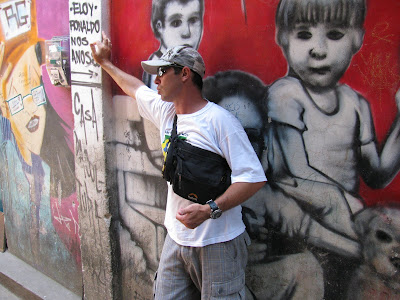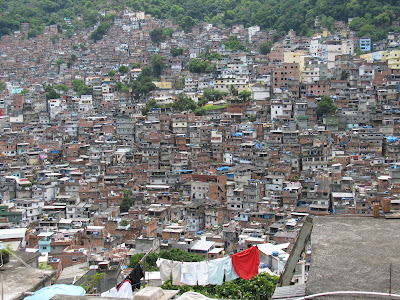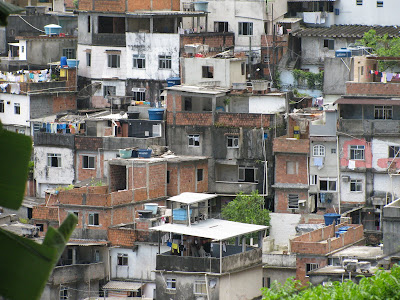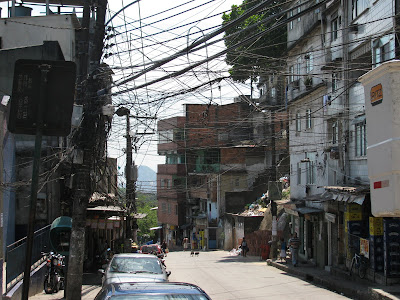Markus, our tour leader, leads trips into the Rocinha favela everyday. Rocinha represent just one of over 150 such favelas in Rio, but this particular one is the largest in all of Brazil. It's an opportunity for him to spread the story of the favelas and the day-to-day life of the people that live there. The favelas of Rio are a very, very violent place but the people seem to be very happy and most are content with the lives that they have. Markus shared that they surveyed many in the Rocinha favela and 83% were happy and content to stay as they were.
Markus, our tour guide...

Our tour began at the entrance to the favela, which sprawling up into the mountain in all directions before us. We had been warned about what to take pictures of and who not to take pictures of. 99% of the people living there are just the poor living their daily lives, working in the city and having an active part of the Rio's society. But 1% of those in the favela represent the violent lives that make the news in Rio and gives it its violent reputation. For this 1% represents the drug dealers, drug lords and gangs that run and control the favelas. The Brazilian government has no control of the favela or life there. The de facto government is instead the big bosses of the favelas, many of which live elsewhere under a veil of secrecy and possibly reaching far up into the government in Brazil and even surrounding countries.
Markus felt that our his tours were safe, as the boss of the Rochina favela had decreed that the gringos (whites) were off-limits. We started the tour by riding on the backs of motorcycles up the winding streets of the favela...talk about a hair-raising experience.
Traffic was uncontrolled chaos among those winding streets with motorbikes, buses and people everywhere. We rode on the backs of randoming chosen drivers, whom Markus assummingly knows, as they rode up. The ride lasted for about five minutes. We then started our descent from the mountain through the maze of narrow "streets". The favela's population has exploded in the last ten years...nearly doubling.
Markus brought us face-to-face with the locals. We interacted with local artists/painters who were using their talents and skills to organize a gallery and display their work. They chose productive routes to harness their talents rather than using it for dealing drugs. The drug life is very enticing to some. It provides handsome rewards, an exciting lifestyle, but usually at the price of their lives before they even reach 30. Markus also brought us to a local bakery, a market selling handmade bracelets made from colored telephone cable wires and also a daycare. The daycare was a not-for-profit that was established to help the working poor of the favela and their childcare needs. Each instance showed ways that life in the slums wasn't all about drugs and violence.
Unfortunately, the violence is ever present. The day we were there at Rocinha's, there was a war going on in another favela in Rio. We were in Rocinha as we passed TV monitors showing the news as the police entered another favela. The police are hated and despised in the favela, obviously by the drug dealers but also by everyone else in the favela. The stories he shared were griping. The wars can last for a month and can shut down whole sections of the city as these wars affects the lives of everyone in Rio, as the impacts are not limited to just the slums.
I've included some pictures of my four-hour trip into Rocinha. I am also including a link to Markus' organization doing work in the Rocinha favela... www.bealocal.com


All of the pipes and power lines in the favela are just a tangled mess. Wide streets have narrowed to just alleyways. The boundaries of the favela are set, so there is nowhere else to build but up...and up they do go.






No comments:
Post a Comment